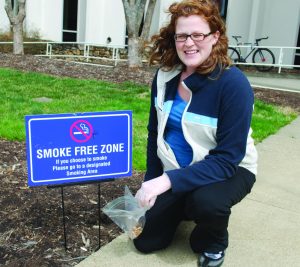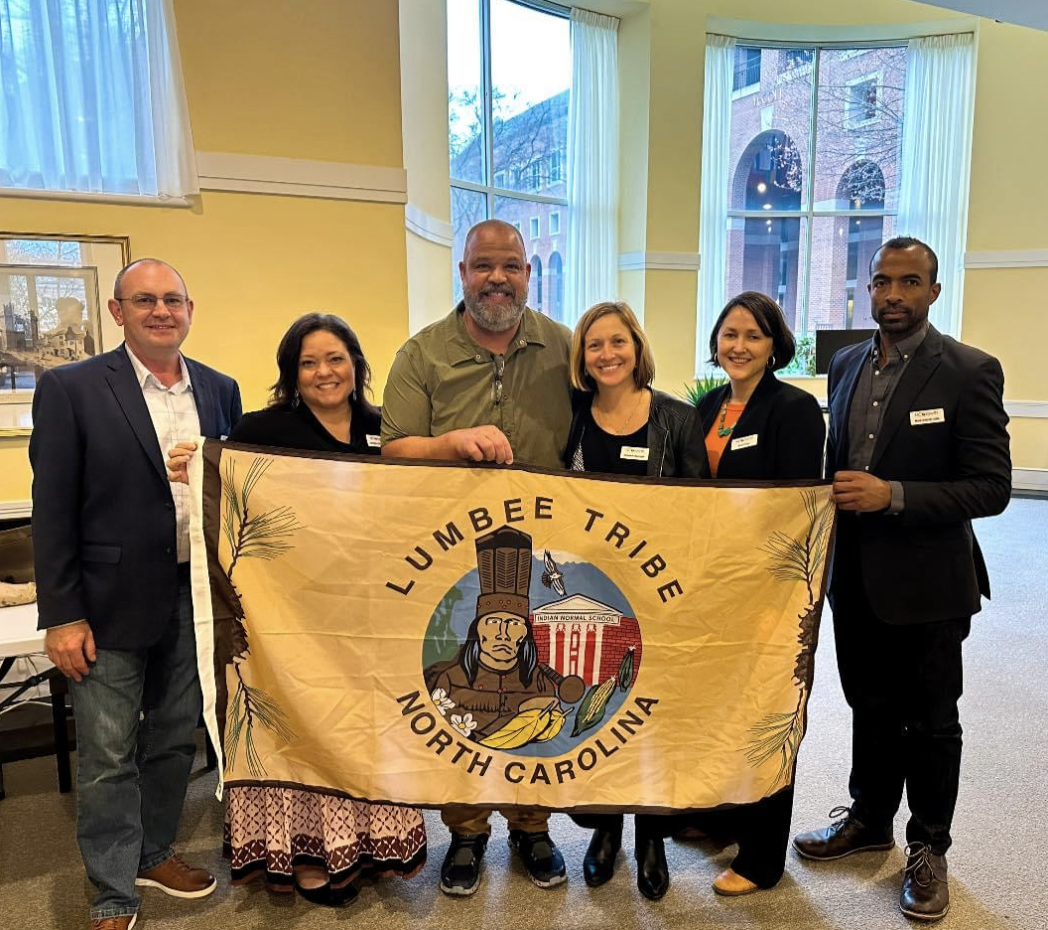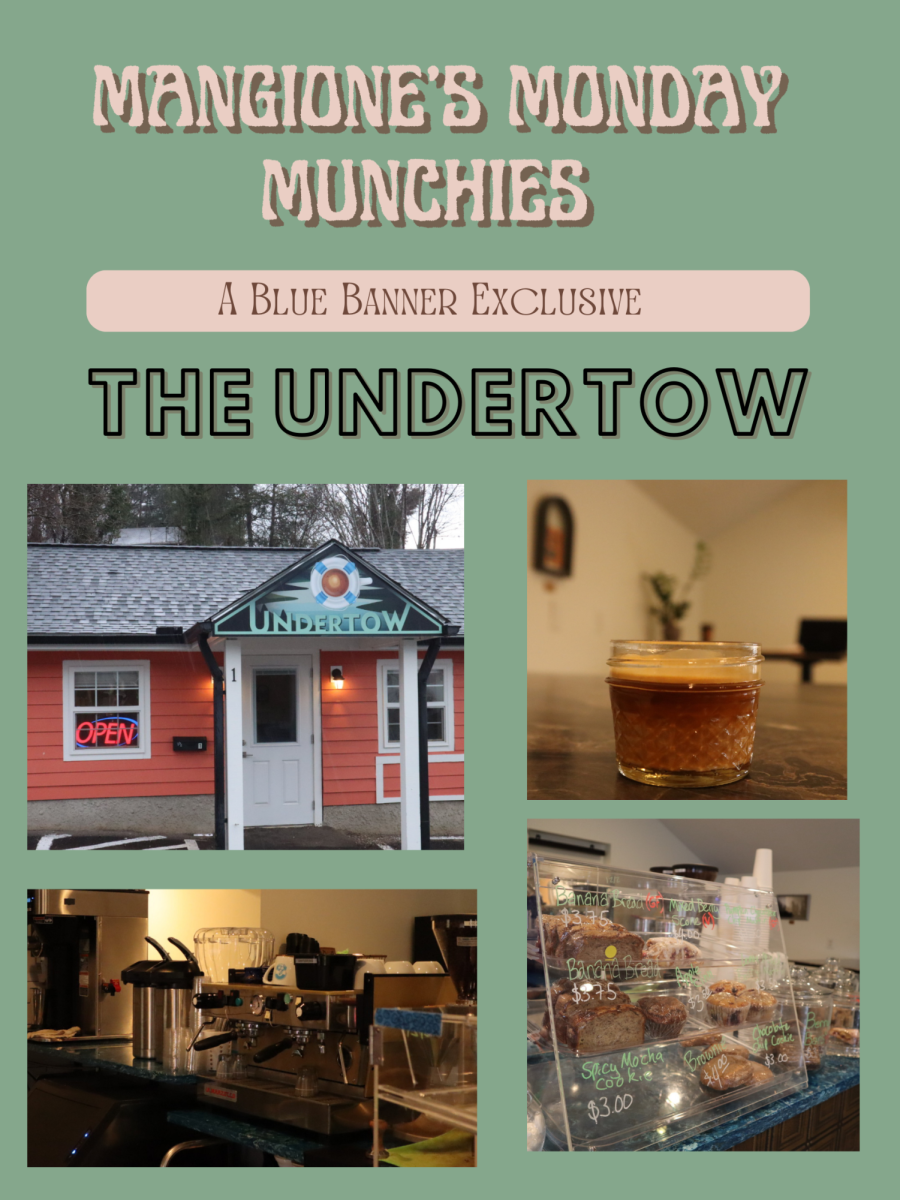By Ashika Raval – [email protected] – Staff Writer

Photo by Amanda Cline – Staff Photographer
As overwhelming amounts of scientific research and data about the negative effects of individual and secondhand smoke continue to be released to the public, emerging tobacco-prevention efforts grow nationwide.
Kick Butts Day, a national day of activism that aims to empower youth to stand up against tobacco, took place on UNC Asheville’s campus on March 19. Laurie Stradley, director of state and community collaboration at the North Carolina Center for Health and Wellness and David Gardner, executive director of the N.C. Health and Wellness Center, continue to work with Bill Haggard, vice chancellor for student affairs, in increasing tobacco prevention efforts and enforcing smoking policies on UNCA’s campus.
“Because of our role that we place in workplace, wellness here on campus and our focus on primary prevention, it seemed to make sense that we get involved in Kick Butts Day. Also, Stradley and I are both a part of the smoking policy committee,” Gardner said.
This year, Stradley and other members of the UNCA community took time out on Kick Butts Day to pick up cigarette butts throughout campus and enforce the university smoking policy.
Though the campus smoking policy states smoking is prohibited on campus unless in a designated smoking area, members of UNCA’s community continue to smoke in prohibited areas.
A majority of the cigarette butts collected on Kick Butts Day were around non-designated smoking areas, Gardner said.
“I think enforcement and monitoring of any smoking policy or any policy that involves individual behavior is always challenging. It’s effective to the degree that you can clearly monitor and effectively communicate what the policy says and to enforce the policy in the most important way,” Gardner said. “It falls to the individual employee or student to understand the policy and take it on themselves to intervene and confront or approach someone who is violating the policy.”
Gardner said society is partly to blame for smoking on campus.
“There’s an attitude on campus, that’s not just limited to students. We live in a country where individual and personal decision-making is valued and individual behaviors are considered private and personal choices. That’s credible and valid; however, when a person’s individual behaviors impact someone else in a very direct way and we know that there indisputable scientific evidence that shows that second and third hand smoke on nonsmokers or other smokers is significant, we can’t ignore that and we shouldn’t ignore that,” Gardner said.
Thomas Meigs, an associate professor of molecular and chemical biology, also joined Stradley in the butt pickup, and though it’s not always easy, as a member of the UNCA community, he said he takes on the responsibility of enforcing the policy.
“I think one of the largest misconceptions about cigarette smoking is that this activity harms only the smoker. I have asked smokers outside the library and Zeis front doors to stop smoking in those locations, and sometimes a smoker will argue that the activity is solely his or her problem and personal decision in regard to health risks,” Meigs said.
U.S. Surgeon General Richard Carmona recently said the debate is over.
“The science is clear: Secondhand smoke is not a mere annoyance, but a serious health hazard that causes premature death and disease in children and nonsmoking adults.”
The U.S. Surgeon General also said several years ago there is simply no level of secondhand smoke that is harmless. If someone can smell the cigarette smoke, even for a few seconds, they are placed in a situation that is harmful to their health.
“We are a university with a core value of being a ‘culture of evidence,’ and the scientific evidence is now beyond overwhelming that secondhand smoke is dangerous to the short-term and long-term health of people who breathe it,” Meigs said.
In short term, secondhand smoke increases the stickiness of platelets, which are cells in blood involved in clot formation, disrupts the ability of the heart to regulate its beating rate, damages the cells that line blood vessels, causes irritation and damage to the cells lining the airway, which can trigger asthma attacks and numerous other adverse effects, Meigs said.
Savannah Henderson, a freshman advocate for tobacco prevention, also participated in Kick Butts Day, sharing her research on secondhand smoking and its adverse effects.
“I’ve become passionate about this cause because of the personal issue with my grandmother and grandfather and just seeing how harmful it can be to people’s health and also the negative effects it has on the family,” Henderson said. “People think it’s very isolated to the smoker, but it affects everyone involved in the family, including the children.”
Henderson also interns and serves as a full leader with the Buncombe County Health Department and focuses on the education and advocacy of tobacco prevention.
“My friends and youth in general aren’t very offended by my work, because they feel like they have the right and can make the choice and they don’t really care if I agree with it. I’ve found that adults are often times more offended when I approach them with research. My grandmother would always get offended whenever I’d come around and she’d say things like, ‘I’m gonna go smoke in the back,’ or, ‘Don’t worry I won’t get any tobacco smoke on you,’” Henderson said.
At many events Henderson organized, she has been approached with opposition, from people literally laughing in her face to questioning why she is trying to make a change.
“I’m doing it is because I saw the harm of tobacco, and I don’t want that same tobacco that caused all that pain in my grandfather’s life and my family, to be taken so lightly. It’s a prevention effort to go out there and educate the public and to make sure they’re not misinformed. And of course on a college campus, you’re going to have people who don’t agree, but if I can affect one person, then my work is done,” Henderson said.
There are two key elements in successful tobacco or smoking policies: communication and enforcement, Gardner said.
“Really good communication is essential from the get go. If you’re going to establish or expand a policy, you’ve got to be sure to communicate what the policy is and make everyone aware of it. Don’t limit it to signs – use Facebook, Twitter or even email – whatever means it takes to reach the audience you need to reach,” Gardner said.
Not just the communication of the policy is important, but also communication of how the policy will be enforced and what the consequences will be if the policy is violated; all of these things must be consistent and ongoing, Gardner said.
That is probably the biggest challenge, because the way the policy is structured, enforcement falls on all of the members of the university’s community; faculty, staff, students. So if we have rules, we’re all expected to abide by the rule, but also to remind our cohabitants what the rules are and say in an appropriate and clear way that this is violating our rules,” Gardner said.
According to Gardner, the overriding policy with any smoking policy, Kick Butts Day or tobacco prevention is this is a public health issue and it’s not about depriving someone of their right to choose to smoke.
“It should be about ensuring that everyone has a right to healthy clean air and to be protected from unintended consequences of someone else’s choices and behaviors,” Gardner said.


















